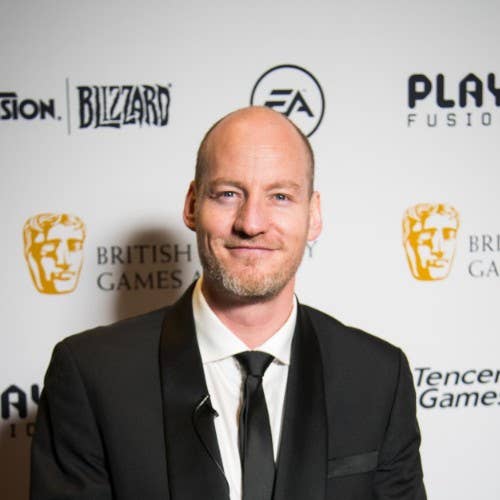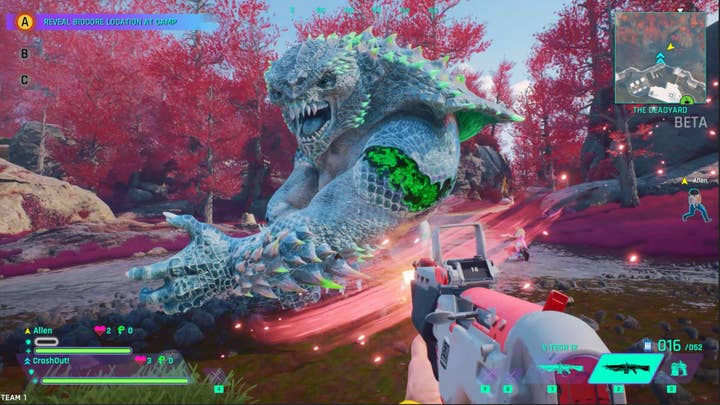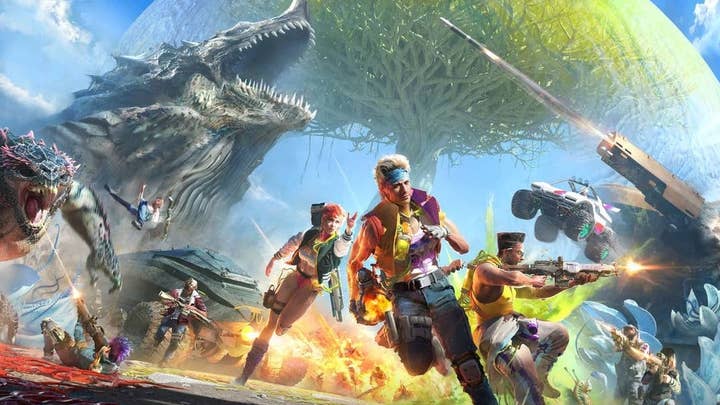How Playfusion's Ascendant is rising from the ashes of Lightseekers
Studio discusses its transmedia ambitions and the challenges of launching a new IP into a crowded market
Earlier this year, UK developer Playfusion unveiled its newest game Ascendant Infinity, which aims to shake up the online multiplayer space with matches that change every time.
The title goes beyond just changing what equipment is available, or where the point-scoring items needed to win are located; it also triggers random events such as air strikes or monster spawns that can disrupt players' strategies.
The studio's founder Mark Gerhard tells GamesIndustry.biz that, after a long time in stealth mode, the team was relieved the initial reveal went down well: "People are looking for fresh content, stuff that's innovative. I think there's a fatigue around sequels, the next battle royale, and things like that. People are happy to see we've taken the risk to innovate, to create this 'adaption shooter' and event-driven gameplay mechanic."
Players, influencers, and press all loved the game, Gerhard tells us. The studio boss tells us that several media outlets criticised the name heavily, but that seemed to be the only sticking point (easily solved by dropping the 'Infinity' and re-revealing the game under the simplified title Ascendant during this month's Future Games Show). Now the team is focused on making a title that delivers on the initial hype.
"The team and I are super pumped – we really think we've got something special here," says Gerhard. "But the game is the tip of the iceberg. There's a crazy transmedia vision that we've been working on for nine years that we're hoping to realise, but it doesn't matter until the game works."

"If this works, this will be an overnight success that only took ten years to make"Mark Gerhard
Details of this transmedia vision haven't been fully announced yet, but Gerhard does tell us that a pilot for a TV show has been written by the creative minds behind Arcane, the animated Netflix show based on Riot Games' League of Legends. Playfusion also holds patents for tech that Gerhard describes as "Shazam for video" that will help link the show to the game, as well as plans to put players' characters in the TV show.
If this sounds ambitious for an independent studio, and perhaps a little random, it's worth noting that Playfusion's debut title Lightseekers was also built around transmedia. In addition to the digital collectible card game at its heart, Lightseekers encompassed a range of toys-to-life products, with plans for comics, TV series, board games and more – but it was scuppered by the collapse of a crucial partner, Toys R US, just a few weeks after launch.
"The genesis of PlayFusion in 2015 was [that] we wanted to build this transmedia universe," Gerhard explains. "No one has delivered on transmedia – I think we need better words to describe it.
"Lightseekers was the start. That ended for us with tremendous sadness, of course, because we had just launched it and four weeks later, Toys R Us went bankrupt. They had everything – all our products, all our cards. And the game was free because it was there to support the ecosystem."
A multiplayer shooter seems like a dramatic pivot from a collectible card game for the studio, we note. But Gerhard says that the studio does have some heritage in this field.
While most of the team are former staff from Runescape developer Jagex, where Gerhard was once CEO, others were brought on board from Eurocom after that studio was closed at the end of 2012. With them, they brought the talent behind the last three James Bond games: the 2010 Goldeneye reimagining for Wii, 2011's expanded Goldeneye Reloaded for Xbox and PlayStation, and 2012's 007 Legends.
"The team's expertise and passion really is to make the game we've made now," he says. "Lightseekers was a stepping stone or a proof point for doing this. After all of that, we recapitalised the business ourselves and just said, 'Let's just follow our dream. Let's just make our game, not a game to support toys or whatever else' – and that is Ascendant. If this works, this will be an overnight success that only took ten years to make."
Building a new games IP at the heart of a transmedia empire is hardly a new venture. Scores of companies, even AAA publishers, have attempted to bring their brands into other forms of entertainment in a connected way, but very few have succeeded. There are a myriad reasons why these firms have struggled and two in particular come to mind. Firstly, each transmedia product needs to stand out as best-in-class in its field, and secondly, the price of entry can be high if fans are expected to buy a range of comics, books, and more, alongside the central game.
"I know what you mean: if bigger companies with bigger resources, better IP, and bigger communities have not been able to be successful, why could we?" Gerhard says. "It is hard without doubt. If it was easy, it would have been done. I'm convinced this is the future of our art form, and it will evolve to this."
The Playfusion founder asserts that transmedia games brands have yet to truly take off because "there hasn't been the world-class example of it." But he believes that once there is – "and I'm hoping that it's us" – it will be akin to the advances Dolby made in music: once stereo became available, fewer people wanted mono experiences.
That said, he acknowledges that managing multiple products in different forms of entertainment increases the risk a company faces: "If any one of these legs in your three-legged chair are knocked out, you fall over. Bigger institutions like us have tried and at the first sign of failure, that's probably when they withdraw."
He quotes Arnold Schwarzenegger, who said in an interview last year that: "Losers stay down but winners always get up, dust themselves off and keep going.” Gerhard says the same is true of Lightseekers and Playfusion's transmedia vision: "If you accept defeat of your first failure, you're right."
For now, the primary focus is the Ascendant game. Gerhard reveals the development process has actually been very different to any game he and the team has worked on before.
"We grey-boxed everything and just used placeholder art [for a long time]," he explains, "because we really wanted to find the fun and build the systems and the mechanics. We knew we could [make] art [for] our game.
"I've been on a lot of projects where art runs first and foremost because it's the most satisfying, the most visual, and because if you see awesome stuff, you think you've got an awesome game, and then you actually find that that last bit is really hard. For us, it was the inverse; we didn't even worry about art, we just said 'Let's find the fun' and hopefully build something that will be a game for the next two decades."

Gerhard adds with a laugh that once the art was put in, it caused crashes and issues with performance and framerate, so the team has been focused on addressing these ahead of the upcoming beta.
"Obviously, on super high-end stuff it's fine, but we want to make sure we can get as many players as possible and sort of trying to low-mid spec, but at the same time not compromise the creative vision."
As for expectations, Gerhard recognises that – even with its 'adaption shooter' angle – Ascendant is launching into one of the most competitive spaces on the market: live service online multiplayer shooters. But the studio's chief marketing officer Murray Pannell (formerly of PlayStation, Ubisoft, EA, 2K Games and more) remains confident about the title's chances.
"One of our biggest challenges is the awareness and the cold start scenario"Murray Pannell
"This was so much more advanced than many other games I've been working on at the same time frame," he says. "One of our biggest challenges, particularly from a marketing point of view, is the awareness and the cold start scenario. How do you break through in a complex and crowded marketplace where there's an awful lot of institutional games that people are already embedded in and wedded to?
"We don't need to be as big as Fortnite or Call of Duty to be successful. We'd love to be, but that's not our initial ambition. I think we will find a really good game for a good audience who will love this and play it a lot, and we'll grow from there."
Gerhard concludes: "Players won't believe what they're playing came from an independent studio. People will perceive this as a big AAA production. That's where we're all hoping to put a little dent in the universe and defy convention. I think we're close to that. We've still got to breakthrough in a crowded space, but I think we can do that."

